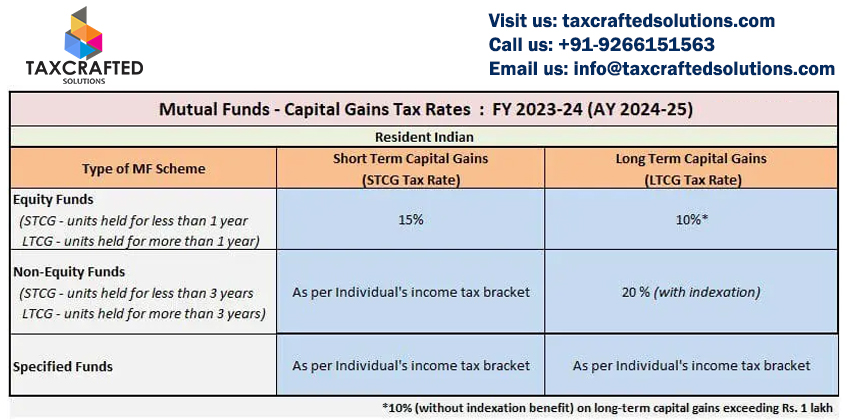
Capital Gains Tax on Securities for FY 2024-25: Shares, Equity Mutual Funds & More
As the financial year 2024–25 begins, understanding the updated capital gains tax rules on securities such as shares and equity mutual funds becomes crucial for investors and taxpayers. With evolving tax norms, staying compliant while maximizing tax efficiency is essential.
Whether you're a seasoned investor or a first-time trader, this comprehensive guide will walk you through how capital gains are taxed in FY 2024–25 and what you should be aware of when filing your returns. For those seeking professional help, approaching a Tax Consultant Company in Delhi can provide clarity and peace of mind.
What is Capital Gains Tax?
Capital gains tax is levied on the profit you make when you sell a capital asset—such as stocks, equity mutual funds, or property—at a price higher than its purchase cost. In India, the gains are categorized as:
- Short-Term Capital Gains (STCG): Gains from the sale of equity shares or equity mutual funds held for less than 12 months.
- Long-Term Capital Gains (LTCG): Gains from the sale of equity shares or equity mutual funds held for more than 12 months.
Capital Gains Tax Rates in FY 2024–25
1. Short-Term Capital Gains (STCG)
- Taxed at 15% under Section 111A of the Income Tax Act.
- Applicable only when Securities Transaction Tax (STT) has been paid on purchase and sale of listed equity shares or equity mutual fund units.
2. Long-Term Capital Gains (LTCG)
- Taxed at 10% on gains exceeding ₹1 lakh in a financial year.
- No indexation benefit is allowed for LTCG on equities.
- LTCG is applicable only if STT is paid on both acquisition and sale (for shares), or on sale (for equity mutual funds).
Note: “ If you made ₹2 lakh profit on equity investments held for over 12 months, ₹1 lakh will be tax-free, and ₹1 lakh will be taxed at 10%—amounting to ₹10,000. ”
How Gains Are Calculated
To compute capital gains, you subtract the purchase price (adjusted for corporate actions like bonus or split) from the sale price.
Example:
If you bought shares worth ₹2,00,000 and sold them for ₹2,80,000 after 15 months:
- LTCG = ₹80,000
- Tax = NIL (as it's below ₹1 lakh exemption threshold)
However, if your LTCG exceeds ₹1 lakh, the excess will be taxed at 10%.
Taxation on Mutual Funds
Equity Mutual Funds
- Follow the same tax rules as equity shares.
- STCG @ 15%; LTCG @ 10% (after ₹1 lakh exemption).
Debt Mutual Funds (Post-April 2023 Update)
- Gains are added to your income and taxed as per slab rates (no indexation or LTCG benefit).
- Applies to funds where less than 35% is invested in equities.
" Many investors overlook the recent changes in taxation of debt funds. Consulting a qualified professional from a Tax consultant services in Delhi can help avoid costly mistakes. "
Grandfathering Clause (Still Relevant?)
The LTCG tax was reintroduced in Budget 2018. For assets acquired before 31 January 2018, the highest price on that date is considered for gain calculation—this is known as the grandfathering clause.
Although this doesn’t apply to newer investments, it remains relevant for legacy investors still holding old portfolios.
Exemptions and Set-Offs
1. Exemption under Section 54F/54EC:
You may get exemption from LTCG if the proceeds are invested in specified bonds or residential property under certain conditions.
2. Set-Off of Capital Losses:
- STCL can be set off against STCG or LTCG.
- LTCL can only be set off against LTCG.
- Unused losses can be carried forward for 8 years.
" Optimizing set-offs and exemptions is not a DIY task. Collaborating with the Best Tax Consultant company in Delhi ensures every available relief is utilized. "
Reporting in ITR
Capital gains must be accurately reported in your Income Tax Return:
- ITR-2: For individuals with capital gains (without business income).
- ITR-3: For individuals with business/professional income and capital gains.
Ensure you have Form 26AS, AIS (Annual Information Statement), and all transaction proofs. Mismatches can lead to scrutiny by the Income Tax Department.
Compliance Tips for FY 2024–25
- 1. Maintain detailed records of buy/sell transactions with dates and amounts.
- 2. Be mindful of corporate actions like splits, bonuses, or mergers.
- 3. File your return on time—preferably with help from expert professionals.
- 4. Track your gains quarterly for tax planning and estimated advance tax payments.
- 5. Consider tax harvesting strategies—realizing LTCG up to ₹1 lakh each year tax-free.
" Planning your equity investments with tax implications in mind helps reduce your burden. A trusted Tax Consultant Company in Delhi can map out strategies for you. "
Conclusion
With changing tax regulations and the introduction of digital tracking like AIS, taxpayers must be more diligent than ever in managing and reporting capital gains from securities. Whether it’s equity shares or mutual funds, understanding tax liability and leveraging exemptions is the key to tax-efficient investing.
Engaging a professional through a Tax consultant services in Delhi not only ensures compliance but can also help in maximizing your post-tax returns. If you're looking for personalized strategies, audit-proof documentation, and year-round support, partnering with the Best Tax Consultant company in Delhi could be your best financial decision this year.






